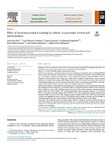Mostrar o rexistro simple do ítem
Effect of respiratory muscle training in asthma: a systematic review and meta-analysis
| dc.contributor.author | Lista-Paz, Ana | |
| dc.contributor.author | Bouza Cousillas, Lucía | |
| dc.contributor.author | Jácome, Cristina | |
| dc.contributor.author | Fregonezi, Guilherme | |
| dc.contributor.author | Labata-Lezaun, Noé | |
| dc.contributor.author | Llurda-Almuzara, Luis | |
| dc.contributor.author | Pérez-Bellmunt, Albert | |
| dc.date.accessioned | 2022-12-12T09:28:33Z | |
| dc.date.available | 2022-12-12T09:28:33Z | |
| dc.date.issued | 2022-12-01 | |
| dc.identifier.citation | Lista-Paz A, Bouza Cousillas L, Jácome C, Fregonezi G, Labata-Lezaun N, Llurda-Almuzara L, Pérez-Bellmunt A. Effect of respiratory muscle training in asthma: a systematic review and meta-analysis. Ann Phys Rehabil Med. 2022 Dec 1;66(3):101691. | es_ES |
| dc.identifier.issn | 1877-0657 | |
| dc.identifier.uri | http://hdl.handle.net/2183/32164 | |
| dc.description | Review | es_ES |
| dc.description.abstract | [Abstract] Background: The last systematic review about respiratory muscle training (RMT) in people with asthma was published almost 10 years ago. Since then, several works have been published. Objective: To review the effect of RMT in people with asthma. Methods: We conducted a systematic review of research included up to September 2021 in PubMed/MEDLINE, PEDro, Scopus, Web of Science, CINAHL, LILACS, Cochrane Central Register of Controlled Trials and ClinicalTrials.gov. We included randomized controlled trials and quasi-experimental studies assessing the effect of RMT on respiratory muscle function, rescue medication, asthma-related symptoms, lung function, exercise capacity, healthcare use, health-related quality of life (HRQoL) and adverse effects in people with asthma. Risk of bias and methodological quality were assessed with the Cochrane Risk of Bias assessment tool and the PEDro scale. Meta-analysis was performed whenever possible; otherwise a qualitative approach was followed. Results: Eleven studies (270 participants) were included, 10 with only adults and were included in the meta-analysis. Inspiratory muscle training (IMT) had beneficial effects on maximal inspiratory pressure (PImax: mean difference [MD] 21.95 cmH2O [95% confidence interval [CI] 15.05; 28.85]), with no changes in maximal expiratory pressure (MD 14.97 cmH2O [95%CI -5.65; 35.59]), lung function (forced expiratory volume in 1 sec: MD 0.06 [95%CI -0.14; 0.26] L; force vital capacity: MD 0.39 [95%CI -0.24; 1.02] L) and exercise capacity (standard mean difference [SMD] 1.73 [95%CI -0.61; 4.08]). Subgroup analysis revealed that IMT load >50% PImax and duration >6 weeks were beneficial for exercise capacity. The qualitative analysis suggested that IMT may have benefits on respiratory muscle endurance, rescue medication and exertional dyspnoea, with no adverse effects. Conclusions: This systematic review and meta-analysis showed a significant increase in PImax after IMT in adults with asthma and reinforced the relevance of the dose-response principle of training. More evidence is needed to clarify the effect of IMT in respiratory muscle endurance, rescue medication, exercise capacity, healthcare use and HRQoL. | es_ES |
| dc.language.iso | eng | es_ES |
| dc.publisher | Elsevier | es_ES |
| dc.relation.uri | https://doi.org/10.1016/j.rehab.2022.101691 | es_ES |
| dc.rights | Creative Commons Attribution-NonCommercial-NoDerivs 4.0 International Licence (CC-BY-NC-ND 4.0) | es_ES |
| dc.rights.uri | http://creativecommons.org/licenses/by-nc-nd/4.0/ | * |
| dc.subject | Asthma | es_ES |
| dc.subject | Breathing exercises | es_ES |
| dc.subject | Maximal respiratory pressures | es_ES |
| dc.subject | Physical therapy modalities | es_ES |
| dc.subject | Systematic review | es_ES |
| dc.title | Effect of respiratory muscle training in asthma: a systematic review and meta-analysis | es_ES |
| dc.type | info:eu-repo/semantics/article | es_ES |
| dc.rights.access | info:eu-repo/semantics/openAccess | es_ES |
| UDC.journalTitle | Annals of Physical and Rehabiliitation | es_ES |
| UDC.volume | 66 | es_ES |
| UDC.issue | 3 | es_ES |
| UDC.startPage | 101691 | es_ES |
Ficheiros no ítem
Este ítem aparece na(s) seguinte(s) colección(s)
-
GI-IPRF - Artigos [133]






